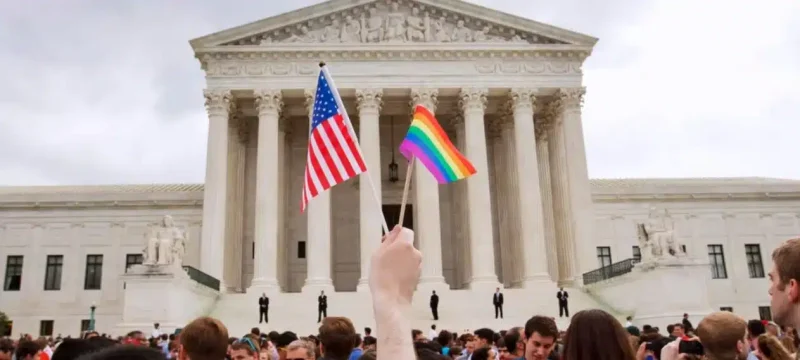The United States Supreme Court issued a decision that enables certain businesses to refuse services for same-sex marriages, which is considered as a setback for the country’s LGBTQ rights. The conservative majority of the Supreme Court agreed to grant site designer Lorie Smith’s request for an exception from a Colorado law that outlaws discrimination based on sexual orientation and other characteristics in a 6-3 ruling.
In 2016, Lorie Smith, an evangelical Christian who opposes same-sex marriage, filed a lawsuit against Colorado’s civil rights commission and other state officials, expressing concern about potential repercussions under the state’s public accommodations law if she refused to provide services for gay weddings. Smith and her legal team contended that being forced to participate in a same-sex wedding would force her to communicate messages contrary to her Christian views, infringing on her First Amendment right to free speech under the US Constitution.
Read more : TikTok Admits Some U.S. User Data Stored in China
Advocates for LGBTQ rights have contended that Smith’s viewpoint violates LGBTQ people’s freedom to obtain products and services from businesses without fear of discrimination. Conservative Justice Neil Gorsuch, writing for the majority, backed Smith’s position, claiming that Colorado intended to compel her to express speech she did not want to deliver, intruding on her protected First Amendment rights.
The Supreme Court decision largely targeted a certain type of commercial activity, such as artists or enterprises involved in content creation. However, leftist Justice Sonia Sotomayor dissenting, warning that this ruling might be extended to any business, adding to the country’s broader “backlash” against LGBTQ equality.
Civil rights organisations and legal scholars cautioned that if the Supreme Court sided with Smith, it might weaken legislation enacted to protect against various forms of discrimination. Many states in the United States have public accommodations laws that prevent companies open to the public from denying goods or services based on factors such as race, gender, sexual orientation, religion, and others. The Anti-Discrimination Act of Colorado, for example, prevents businesses from denying people goods or services on these grounds.
The administration of President Joe Biden backed Colorado in the lawsuit, stating that Smith’s request for an exception went too far, since it sought the ability to prohibit developing any wedding website for same-sex couples, even a basic one with practical data. President Biden voiced profound concern about the ruling, saying it could lead to further discrimination against LGBTQ+ Americans and undercut long-standing protections protecting all Americans from discrimination in public places.
Both the American Civil Liberties Union and the LGBTQ civil rights organisation Human Rights Campaign criticised the verdict, highlighting its possible implications on civil rights laws as well as the safety and inclusion of business settings. The Alliance Defending Freedom, a conservative religious liberties organisation that represents Lorie Smith, hailed the ruling as a win for free speech rights The Supreme Court issued this decision the day after another case in which they unanimously affirmed employees’ ability to receive religious accommodations at work. A former postal carrier sued the Postal Service of discrimination after he was disciplined for refusing to work on Sundays.
The recent verdict by the United States Supreme Court allowing certain companies to refuse services for same-sex weddings has raised worries about the ramifications for LGBTQ rights and civil rights legislation protecting against discrimination.









